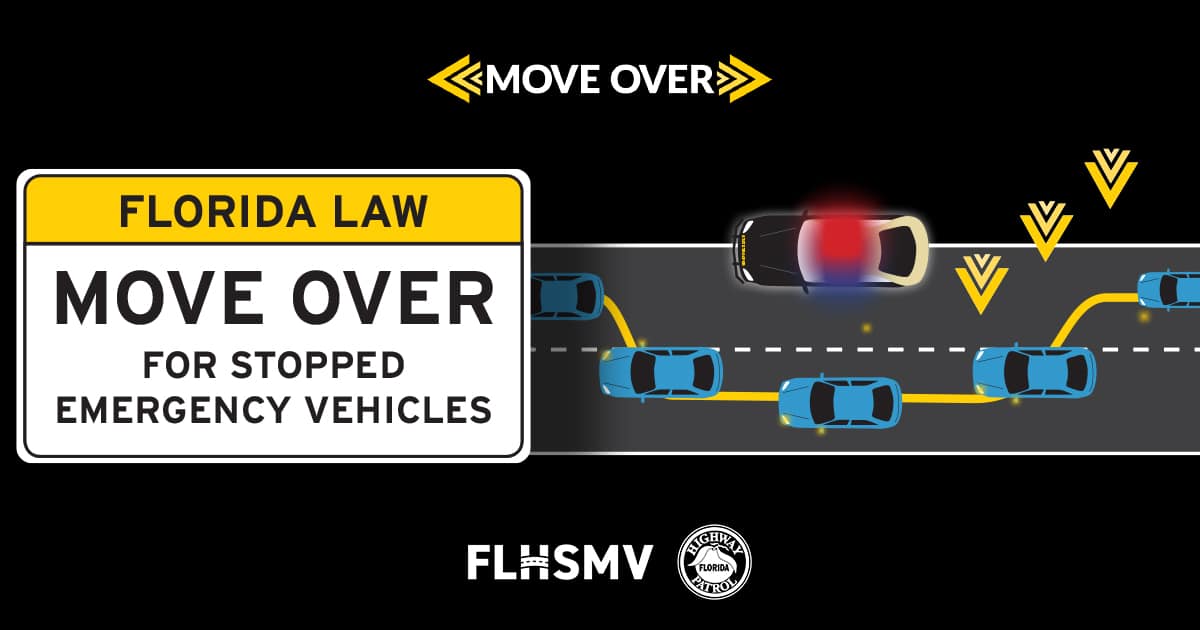The Move Over Law, or Florida Statute 316.126 as it is officially known, was put into effect in 2002 and calls for drivers to properly honor emergency vehicles that are responding to an emergency or providing assistance on the side of the road. This includes both audible and visual signals.
In the presence of an emergency vehicle responding to an urgent situation, drivers are obligated to promptly move away from any intersection and pull over at the closest side of the road. It is essential that everyone remain parked until all vehicles have safely passed.
When passing a stopped emergency vehicle on any road, you must slow to 20 miles per hour less than the speed limit (or 5 miles per hour if the speed limit is 20 mph or below), and vacate the lane closest to that vehicle. If however, you are unable to change lanes due it being single-lane road or two more lanes combined, then your speeds must still be decreased as mentioned before. Pedestrians must also be aware of the Move Over Law and yield to any emergency vehicles that are approaching.
This statute obligates the DMV to launch educational campaigns in order to ensure that the public is informed about the Move Over Act. You can visit FLHSMV’s website to learn more, they provide information on the Move Over Act, here is a bit of information you’ll find on their site:
“Florida law requires you to Move Over a lane — when you can safely do so — for stopped law enforcement, emergency, sanitation, and utility service vehicles, tow trucks or wreckers, and maintenance or construction vehicles with displayed warning lights without advanced signs or channelizing devices.
- If you can’t move over — or when on a two-lane road — slow to a speed that is 20 mph less than the posted speed limit.
- Slow down to 5 mph when the posted speed limit is 20 mph or less.
When you fail to Move Over, you put yourself and others at risk; you could crash into a vehicle or worker.
Violating the Move Over law will result in a fine, fees, and points on your driving record. For more information, see section 316.126, Florida Statutes.”
What constitutes a violation of the Move Over Law?
The Florida Move Over Law applies to a wide variety of circumstances, so breaking it can lead to hefty tickets. Common offenses that fall under this law include speeding by an emergency vehicle or not moving out of the way when one approaches, as well as driving too close behind a parked emergency vehicle on the side of the road.
Whether or not damage is caused, drivers can be ticketed for any of these offenses. In the event that other vehicles or personnel are harmed as a result of someone’s negligence, however, the violation will carry harsher consequences.
Recently in North Port on a stretch of I-75 a North Port patrol car was hit while on the side of the road. This is an example of the importance of being aware of the Move Over Law and following it to ensure everyones safety.
What emergency vehicles does this apply to?
In Florida, the Move Over Law applies to all emergency vehicles that are flashing lights or sirens and actively providing assistance. This includes first responders, tow trucks, and law enforcement. If you come across an emergency vehicle on the side of the road displaying a visual or auditory signal – move over!
Drive safe and follow all laws of the road
It’s important to follow the laws of the roadway, it ensures your safety and everyone around you. If you unfortunately end up in an accident it is absolutely essential to hire an attorney who has extensive experience. FGB Law Firm will guide you through the entire process while reviewing the facts to best advise on how to pursue compensation for your losses. Call 941-979-9010 or complete our online consultation form today to schedule your free consultation.


